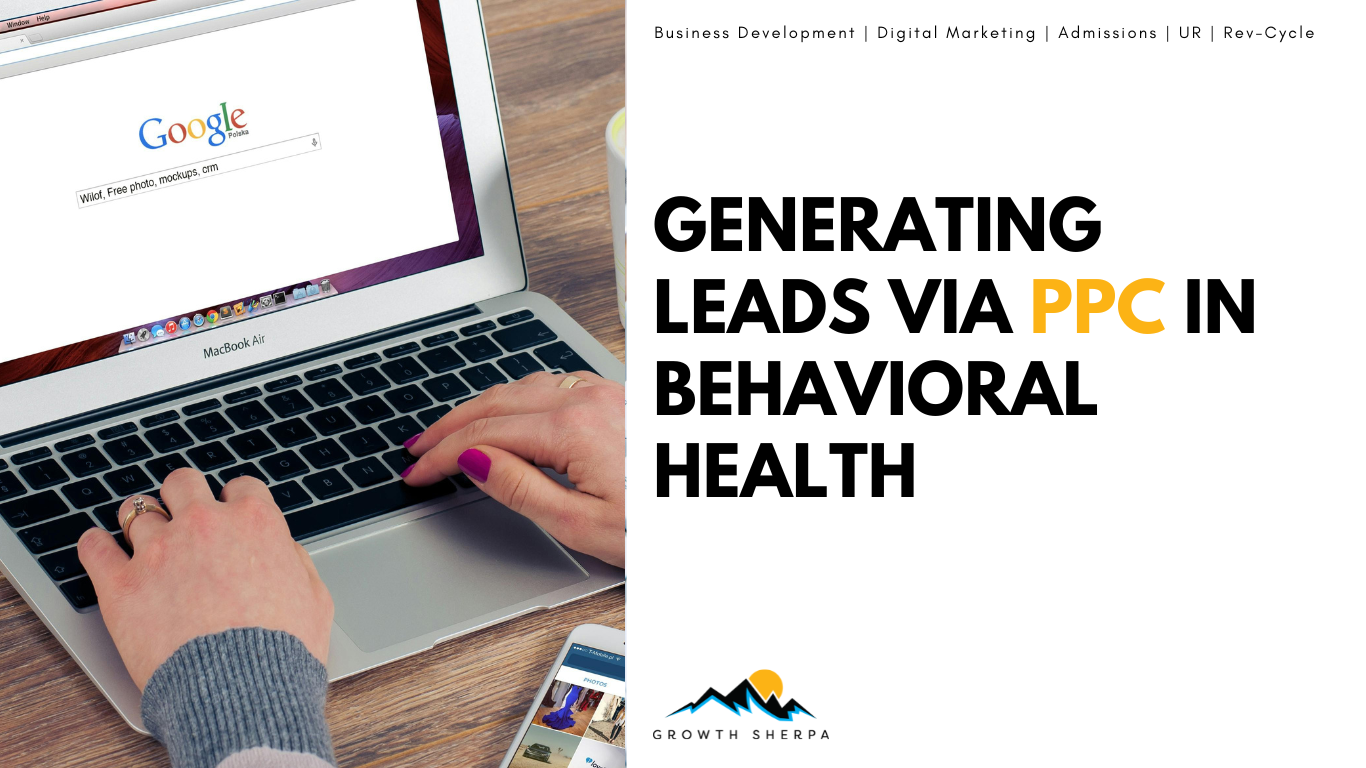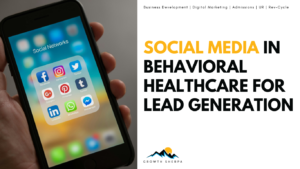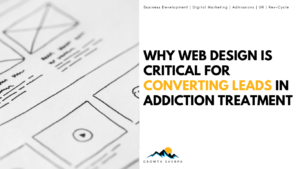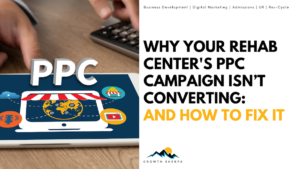The behavioral health and addiction treatment industry has unique challenges when it comes to marketing. Unlike many other industries, you’re not selling a product — you’re offering a life-saving service. In a crowded market where patients and their families are overwhelmed with choices, standing out is essential. One of the most effective ways to get in front of potential patients at the right moment is through pay-per-click (PPC) advertising.
PPC advertising, especially when leveraged through platforms like Google Ads or Facebook, allows behavioral health facilities to generate high-quality leads, often from individuals or families in immediate need of help. However, because this industry has its own set of rules and ethical considerations, it’s essential to approach digital advertising with a strategy that balances effective targeting with empathy.
In this blog, we’ll dive deep into how PPC works, how it can be used to generate leads for your rehab facility or behavioral health center, and the key strategies to ensure your campaigns drive the right kind of traffic — those ready to take the first step toward recovery.
What is PPC Advertising?
PPC advertising is a model of digital marketing where advertisers pay each time a user clicks on one of their ads. It allows you to position your facility at the top of search results on Google or in the newsfeeds of social media platforms like Facebook, Instagram, or LinkedIn. The beauty of PPC is that it allows you to get in front of individuals actively searching for services, such as addiction treatment or mental health care.
In behavioral health, PPC is especially effective because it targets individuals at critical moments — when they are searching for help for themselves or a loved one. When done correctly, PPC can attract high-intent leads, meaning people who are closer to making a decision and ready to take action.
However, with great power comes great responsibility. Behavioral health PPC campaigns must be executed thoughtfully, adhering to strict advertising regulations and ensuring that your message is both ethical and effective.
The Benefits of PPC for Behavioral Health Facilities
- Immediate Visibility
One of the greatest benefits of PPC advertising is the immediacy it offers. Unlike organic SEO efforts, which can take months to show results, PPC campaigns can start driving traffic to your website almost as soon as the ads go live. This is crucial for facilities that need immediate results, whether it’s to fill beds or to increase call volume. - Targeted Advertising
PPC platforms like Google Ads allow you to target specific audiences based on keywords, location, and even the time of day. This is particularly important in behavioral health, where certain search terms like “addiction treatment near me” or “rehab centers for alcohol” can lead directly to high-quality leads.
Additionally, with Facebook and Instagram, you can build highly specific audience segments based on age, interests, behaviors, and even life events. This ensures that your ads are only shown to people who are likely to be interested in your services, helping you avoid wasted ad spend on irrelevant clicks.
- Cost-Effective Lead Generation
With PPC, you’re only paying when someone clicks on your ad, meaning you aren’t wasting money on impressions that don’t convert into site visits. By setting your budget and optimizing your campaigns over time, you can manage your ad spend effectively while seeing consistent results.
PPC also allows for granular control of your budget. You can start small, test different ad variations, and gradually scale up once you find what works. This is essential for facilities that need to see measurable ROI from their marketing efforts.
- Measurable Results
Unlike traditional advertising, PPC allows you to measure your campaign performance in real-time. You can track how many clicks, impressions, and conversions your ads generate, making it easier to assess the effectiveness of your campaigns. This data allows you to fine-tune your targeting, ad copy, and budget to ensure you’re getting the best return on investment.
Key Strategies for Running Successful PPC Campaigns in Behavioral Health
- Choose the Right Keywords
Keywords are the backbone of any PPC campaign. In behavioral health, choosing the right keywords is critical to connecting with individuals who are actively seeking help. Start by focusing on high-intent keywords like “drug rehab near me,” “addiction treatment center,” or “mental health services.” These are terms that people typically use when they are closer to making a decision, meaning they are more likely to convert into leads.
However, it’s essential to avoid overly broad keywords. Terms like “addiction” or “mental health” may attract a lot of clicks, but those clicks won’t necessarily turn into conversions because they may not reflect the intent to seek treatment. Be specific with your keyword choices to ensure you’re targeting the right audience.
- Create Compelling Ad Copy
Your ad copy needs to be concise, empathetic, and action-oriented. You only have a few lines to communicate your message, so make it count. Highlight what makes your facility unique — whether it’s specialized treatment programs, dual-diagnosis capabilities, or your compassionate staff. Your ad copy should address the fears and concerns of those seeking help, offering them a sense of hope and a clear call to action (CTA) like “Call Now” or “Get Help Today.”
Remember, compliance is key in this industry. Avoid making unsubstantiated claims, such as guaranteed recovery, and adhere to all advertising regulations to maintain ethical standards.
- Landing Page Optimization
Even the best PPC ad is wasted if it directs users to a poorly designed landing page. Your landing page is where potential patients or their families will go after clicking your ad, and it’s your chance to convert them into leads.
The landing page should be directly related to the ad that brought users there. For example, if someone clicked on an ad about alcohol addiction treatment, they should land on a page dedicated to alcohol rehab services, not a generic homepage.
Make sure your landing page is easy to navigate, loads quickly, and includes clear contact forms or phone numbers. Additionally, patient testimonials or accreditations from reputable organizations can help build trust and reassure visitors that your facility is a safe, credible option for care.
- Leverage Retargeting Ads
Not every visitor will convert on their first visit to your website. This is where retargeting comes in. Retargeting ads allow you to show your ads to individuals who have already visited your site but didn’t take action. These ads are particularly effective because they remind users of your facility and keep your brand top of mind as they continue their research.
Retargeting is a great way to re-engage potential leads and gently nudge them toward conversion. The key is to create ads that reinforce your message without being overly aggressive. Focus on building trust and providing helpful information, such as the availability of a free consultation or more details about your treatment programs.
- Monitor and Adjust Campaigns Regularly
One of the most critical aspects of running successful PPC campaigns is constant monitoring and adjustment. PPC is not a set-it-and-forget-it strategy. You need to regularly analyze your performance metrics, such as click-through rates (CTR), conversion rates, and cost per conversion, to ensure your ads are driving the desired results.
If certain keywords aren’t performing well, adjust your targeting. If your landing pages aren’t converting, try testing new layouts or CTA buttons. A/B testing different ad copy or images can also help you identify what resonates most with your audience.
By continually optimizing your campaigns, you can ensure you’re getting the best possible results and maximizing your ad spend.
The Challenges of PPC in Behavioral Health
While PPC is a powerful tool, there are specific challenges to running campaigns in the behavioral health industry. The most notable challenge is compliance with advertising regulations. Platforms like Google and Facebook have strict rules governing addiction treatment advertising, primarily due to the potential for unethical marketing practices that have emerged in the past.
In 2018, Google introduced stringent regulations requiring addiction treatment centers to obtain certification from LegitScript before running ads. This ensures that facilities meet certain ethical and quality standards. Failure to comply with these regulations can result in your ads being disapproved or your account being suspended.
Additionally, the sensitive nature of behavioral health advertising requires a careful approach to messaging. Ads that feel exploitative or make exaggerated promises can damage your facility’s reputation and lead to legal issues.
PPC advertising is a powerful tool for behavioral health and addiction treatment facilities looking to generate high-quality leads. When done right, PPC allows you to reach individuals who are actively seeking help, providing them with the information and support they need to take the first step toward recovery.
By focusing on targeted keywords, crafting empathetic and action-oriented ad copy, optimizing landing pages, and consistently monitoring your campaigns, you can significantly improve your facility’s lead generation efforts. However, it’s essential to navigate the unique challenges of PPC in this industry by adhering to compliance regulations and maintaining ethical advertising practices.
Investing in PPC can help your facility fill beds, boost patient acquisition, and ultimately save more lives — all while providing a measurable return on investment.
4o




